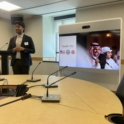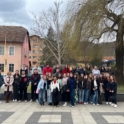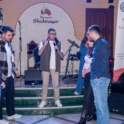Abdulaziz reflects on the highlights from serving as a mentor for CEW.
STORIES
Project RAINBOW
Teryima Manta (YES 2012-2013, Nigeria, hosted by ACES in Aledo, IL) attended a Universal Basic Education (UBE) school, which was not something he was proud of during his adolescent years. Unfortunately, society has a negative perception of UBE schools, and has labeled them as low-quality educational institutions attended only by students from poor families and humble backgrounds. Students who have access to higher quality schools do not associate themselves with UBE students.
Nigeria’s UBE program began in 1999 as a way to improve quality and efficiency of basic education, reduce dropout rates and increase enrollment in primary and secondary school levels. UBEs were Nigeria’s answer for families who were unable to afford the basic fees to attend public schools. The schools provide students with access to nine years of formal education, six at the primary level and three at the junior secondary level.
According to the Centre for Public Impact, the Nigerian public appreciated the program’s objectives in theory, but due to their lack of confidence in the country’s infrastructure, many rejected the idea that UBE schools could provide adequate education to those who attended them.
Because of this negative setback from many in Nigeria, UBE objectives are not often met, and funding is not provided to improve the schools or their quality of education. In addition, UBE students much like Manta face harsh criticism from society. Manta recalls being bullied by his peers at nearby, better funded schools.
“We were reminded daily about our challenges. People called us names like ‘UBE,’ or ‘Freedom,’” Manta said. “Because I had lost both my parents, I was called ‘Mngu a Or Ga,’ which translates to ‘I Have No One.’”
That was over eight years ago. Still today, UBE students are discriminated against, segregated, and called derogatory names by their peers.
To help break this stigma he once dealt with as a UBE student, Manta organized Project RAINBOW, an Interfaith Harmony and Peace Building seminar, on March 2nd at the Adikpo Comprehensive College.
The goal of Project RAINBOW was to teach youth how they could overcome the stigma of being UBE students, and how they are capable of competing at the intellectual level of their peers at non-UBE schools. The program allowed students to reflect personally on morality and the essense of their faith in general.
Manta, along with seven volunteers, held the event for 130 students and 24 teachers from seven schools total. Five were UBE schools and two were non-UBE schools. The students from the two non-UBE schools debated in one room on the topic of diversity within the Christian faith. UBE students took part in a quiz on English, Mathematics, and Christian Religious Studies.
The debate topic was chosen due to recent events happening in Nigeria. A recent protest against the Nigerian Federal Government’s handling of current attacks on Benue villages from Fulani herdsmen led to the fatality of several youth .
During his year in the YES Program, Manta was exposed to the Civil Rights Movement and the work of Dr. Martin Luther King, Jr. He said the current conflict between the Fulani and the local farmers in Benue reminded him of the attacks on African-American citizens in the 1960s.
After the debate, the students learned about the life and ideologies of Dr. Martin Luther King Jr., and how he used love and peaceful demonstrations to significantly alter the life of African-Americans in the United States. The presentation showed students how peace and love can change the world for better rather than violence and discrimination.
In addition to these activities, Manta shared his story and gave the students some words of encouragement.
“Begin to live with the consciousness that you have greatness within you...if just one of you captures the essence of what that means - that you have the responsibility to manifest that greatness within you - you can make your parents proud. You can make your school proud. You can touch millions of people’s lives, and the world will never be the same because you came this way,” Manta concluded.
Overall, the seminar was a huge success, and Manta has already begun making plans to visit more local government schools in Benue state, should adequate funding be raised.





